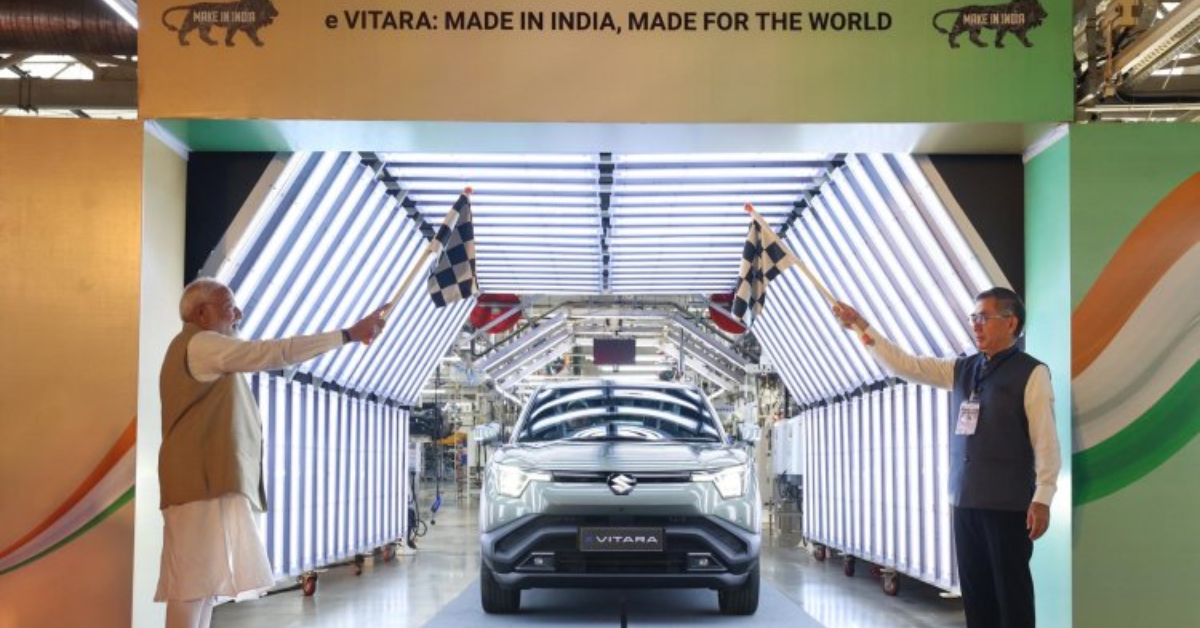India is fast emerging as a hub for electric vehicle (EV) innovation and manufacturing, and the latest development further strengthens this position. Prime Minister Narendra Modi recently flagged off the production of Maruti Suzuki’s much-anticipated e-Vitara, a fully electric SUV, dedicated not just to the Indian market but also for global exports. This marks a historic step in India’s journey towards sustainable mobility and underlines the government’s focus on promoting EV adoption and strengthening the “Make in India” initiative.
The launch of the e-Vitara comes at a time when global demand for clean energy vehicles is at an all-time high. By commencing production in India, Maruti Suzuki has positioned itself as a major player in the global EV supply chain while also boosting the country’s manufacturing ecosystem.
The Significance of PM Modi’s Flag-Off
Prime Minister Narendra Modi personally flagging off the e-Vitara production holds great symbolic and practical importance. It reflects the government’s commitment to supporting green mobility solutions and promoting Indian automotive exports.
This event also aligns with India’s broader vision of achieving carbon neutrality by 2070 and reducing dependency on fossil fuels. By encouraging Indian companies like Maruti Suzuki to produce EVs for both domestic and international markets, India is moving closer to becoming a key player in the global automotive industry.
About the Maruti Suzuki e-Vitara
The Maruti Suzuki e-Vitara is designed as a modern electric SUV that balances affordability, efficiency, and global standards. Here are some of its expected highlights:
- Design: Inspired by the popular Vitara lineup, the e-Vitara retains its sporty SUV stance with aerodynamic styling suitable for EV efficiency.
- Battery & Range: The vehicle is expected to come with a high-capacity lithium-ion battery, providing a range of over 500 kilometers per charge (depending on driving conditions).
- Performance: Built on Maruti Suzuki’s advanced electric platform, the SUV ensures smooth acceleration, high torque, and fast charging capabilities.
- Technology: Features such as a connected infotainment system, advanced driver assistance systems (ADAS), wireless charging, and AI-driven navigation will make it future-ready.
- Safety: Equipped with multiple airbags, ABS with EBD, electronic stability control, and crash safety compliance with global standards.
This makes the e-Vitara not just a domestic-friendly EV but also one that can compete in international markets.
Boost to India’s Export Ambitions
The e-Vitara is not only being produced for Indian customers but also with an export-first strategy. Maruti Suzuki has confirmed that initial production batches will be shipped to Japan and European countries, regions that have already adopted EVs on a large scale.
Exports of the e-Vitara strengthen India’s presence in the global EV market and will enhance the country’s reputation as a trusted hub for high-quality electric vehicles. Moreover, exporting EVs helps in bringing valuable foreign exchange earnings and boosting India’s economy.
Strengthening the EV Ecosystem in India
The production of the e-Vitara is expected to give a significant push to the local EV ecosystem, including:
- Battery Manufacturing: With demand rising, India will see more investments in domestic battery cell production.
- Charging Infrastructure: To support EV adoption, public and private players are expanding fast-charging stations across highways and cities.
- Employment Generation: Large-scale EV manufacturing will create thousands of jobs across engineering, assembly, and supply chain management.
- Technological Advancements: Collaboration with global partners will help Indian companies adopt cutting-edge EV technologies.
This initiative is also aligned with the FAME II scheme (Faster Adoption and Manufacturing of Hybrid and Electric Vehicles) launched by the Government of India, which provides incentives for EV adoption.
Maruti Suzuki’s Vision for the Future
Maruti Suzuki, India’s largest carmaker, has been preparing its electric strategy for years. With the launch of the e-Vitara, the company has officially entered the EV market and plans to introduce more models in the coming years.
Their future plans include:
- Expanding EV offerings across different price segments.
- Collaborating with Toyota for advanced EV technologies.
- Scaling up production to meet both domestic demand and international orders.
- Supporting India’s charging network development through partnerships.
By focusing on affordability and mass-market adoption, Maruti Suzuki aims to replicate its success in the petrol and diesel segment within the EV space.
Government’s Role in Supporting EV Growth
The Indian government has been actively supporting the transition to EVs through initiatives like:
- Tax benefits on EV purchases.
- Subsidies under the FAME scheme.
- Lower GST rates (5% on EVs compared to 28% on petrol/diesel cars).
- Production Linked Incentive (PLI) schemes for battery and EV manufacturing.
PM Modi’s participation in flagging off the e-Vitara is a clear message that the government is committed to making India a global EV powerhouse.
Impact on Indian Consumers
For Indian customers, the e-Vitara promises a new era of mobility. Although the SUV is initially focused on exports, it is expected to be launched in India soon after. Consumers can look forward to:
- Affordable pricing compared to imported EVs.
- Lower running costs due to electricity being cheaper than petrol or diesel.
- Sustainability by contributing to reduced carbon emissions.
- Advanced features that match global standards.
This will make EVs more mainstream in India, especially among middle-class families looking for value-driven options.
Conclusion
The flagging off of Maruti Suzuki’s e-Vitara production by Prime Minister Narendra Modi is more than just a ceremonial event—it represents India’s growing strength in the global electric vehicle revolution. With advanced design, long-range capability, and a strong focus on exports, the e-Vitara is set to become a landmark product not only for Maruti Suzuki but for India’s automotive industry as a whole.
As India accelerates toward sustainable mobility, initiatives like these will ensure that the country not only meets domestic needs but also plays a leading role in shaping the global EV future.
